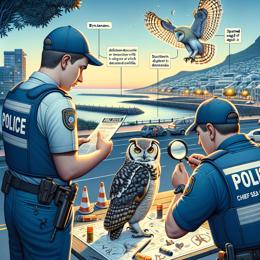Image created by AI
The Battle Against Rhino Poaching in South Africa: KZN's Fight Intensifies after Hluhluwe-iMfolozi Losses
The tragic crescendo of rhino poaching in South Africa has reached new heights in 2023, casting a shadow over the ongoing battle for conservation. In a stark revelation delivered by the Minister of Forestry, Fisheries, and Environment, Barbara Creecy, in an address in Durban - the heart of KwaZulu-Natal (KZN) - it was disclosed that the country suffered the loss of 499 rhinos to poaching in the past year. This surging poaching epidemic witnessed 307 rhinos cruelly stripped of life within the bounds of KZN's iconic Hluhluwe-iMfolozi Park, marking it as the epicenter of this ecological crisis.
South Africa, a global cornerstone for rhinoceros conservation, shelters nearly half of Africa's critically-endangered black rhinos and boasts the largest population of the near-threatened white rhinos in the world. The inflation of poaching activities in the country thus signifies a dire threat to the survival of these majestic species.
A deeper analysis from the Department of Forestry, Fisheries, and the Environment replicates a grim poaching landscape across the nation for 2023. With 406 rhinos falling prey to poachers on state land and an additional 93 felled on private territories, the activities of international criminal networks have become more apparent. Hoisting an increase of 51 poached rhinos compared to 2022, the ruthless quest for rhino horns—coveted in East Asia for traditional medicine and opulent jewellery—continues unabated.
The Hluhluwe-iMfolozi Park's plight against poaching draws particular concern and heartache. Revered for its rich biodiversity and historical significance in rhino conservation, the park's alarming poaching figures throw into question the effectiveness of current protective measures. Despite the park and its rangers' relentless efforts, which culminated in 49 arrests and confiscation of 13 firearms, the scourge relentlessly rips through the park's rhino population.
In contrast to KZN's affliction, Kruger National Park seems to be a silver lining with a 37% decrease in rhino poaching during 2023, signaling that progressive strategies can indeed turn the tide against poaching operations. The comprehensive approach, integrating rigorous law enforcement with community engagement, advanced technology, and ranger welfare programs, could serve as a model for Hluhluwe-iMfolozi Park and other conservation areas.
To preclude rangers from being ensnared in the web of poaching, the South African government has spotlighted increased support for park staff. Enhancements in healthcare, training, and counselling services aim to fortify rangers against the lures of illicit collaboration with poaching syndicates.
The urgency of counteracting rhino poaching in South Africa has reached a critical juncture. International collaboration, alongside a fortified national effort, is needed to preserve these irreplaceable creatures for future generations. While the robust response to this existential threat streams through multiple disciplines, the war is far from over. It is a race against time, where conservation success hinges on each step towards dismantling the poaching networks and reinvigorating community stewardship of natural heritage.










